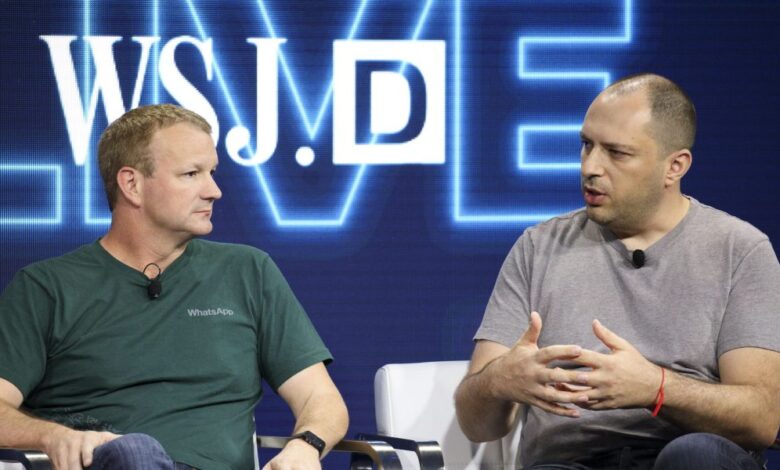

- The cofounders of WhatsApp resisted ads in the app for years, including after the company was acquired by Meta for $22 billion in 2014. Brian Acton and Jan Koum left the company in 2017 and 2018, respectively, and on Monday Meta introduced ads in the “Status” feature as well as sponsored Channels in the the “Updates” tab of WhatsApp.
WhatsApp cofounders Jan Koum and Brian Acton never wanted to include ads in their messaging platform, but new owner Meta moved forward Monday with a plan to do just that.
Facebook and Instagram’s parent company, which bought WhatsApp in 2014, said Monday it would introduce ads in the app’s “Updates” tab, which the company said counts on 1.5 billion users daily. The “Status” feature, which shows disappearing photos or videos, will now include ads much like Instagram “Stories” and advertisers can also now pay to boost their own WhatsApp channels. People and companies that run their own channels will also be able to sell subscriptions to their content, the company said in a blog post.
The new ad features run counter to WhatsApp’s cofounders’ vision. When Koum and Acton first launched the app in 2009 after quitting their jobs at Yahoo! the pair actively resisted adding advertising following previous bad experiences. Instead, they charged users $1 per year for using the service after a free year.
Former CEO Koum reportedly kept a note from Acton on his desk to remind him of the company’s mission, according to Sequoia Capital partner Jim Goetz.
“Jan keeps a note from Brian taped to his desk that reads ‘No Ads! No Games! No Gimmicks!’ It serves as a daily reminder of their commitment to stay focused on building a pure messaging experience,” Goetz wrote in a 2014 blog post.
When Koum and Acton sold the company to Meta (then Facebook) for $22 billion in 2014, Meta assured them it would keep WhatsApp ad-free and the pair wouldn’t have to compromise their principles, Goetz wrote in the blog post. In their own blog post, the cofounders also promised “absolutely no ads interrupting your communication,” the Washington Post reported in 2018.
Still, WhatsApp’s cofounders reportedly later clashed with Meta’s leadership on the monetization of WhatsApp. Both Acton and Koum left WhatsApp, in 2017 and 2018, respectively, after a long battle over pressure for WhatsApp to share more data with Facebook as well as the push by Meta to include ads in WhatsApp.
In 2019, Acton said in an interview with Forbes that Meta’s plans to include ads in WhatsApp’s Status feature broke a social compact with the app’s users. “Targeted advertising is what makes me unhappy,” he said.
When Acton proposed an alternative to advertising on WhatsApp, which included charging users for messages sent after a cutoff of free messages, Sheryl Sandberg, then the company’s chief operating officer, shot him down because it wouldn’t scale, Acton said.
“I called her out one time,” Acton told Forbes. “I was like, ‘No, you don’t mean that it won’t scale. You mean it won’t make as much money as . . . ,’ and she kind of hemmed and hawed a little. And we moved on. I think I made my point. . . . They are businesspeople, they are good businesspeople. They just represent a set of business practices, principles and ethics, and policies that I don’t necessarily agree with.”
A spokesperson for Meta said in a statement to Fortune that the company has been talking about incorporating ads into WhatsApp for years, and added that the new ad features won’t interrupt users’ chats.
“We think this reflects how people want to use WhatsApp and means if you just you WhatsApp to send personal messages to friends and family, nothing changes,” the spokesperson said.
This story was originally featured on Fortune.com
Source link




